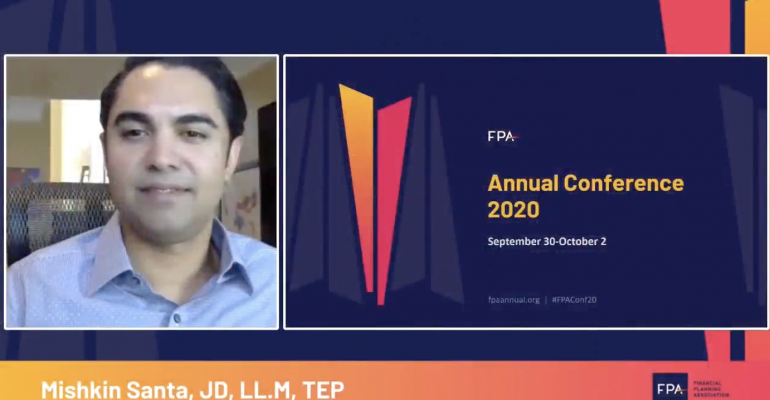We could have the perfect tax storm in 2020 said Mishkin Santa, The Wolf Group’s international tax director during a Financial Planning Association Annual Conference 2020 webcast.
The FPA kicked off its digital conference Wednesday, September 30 using the virtual event platform Pathable. The professional association abandoned an in-person convention, like the rest of the industry, to keep up with social distancing measures spawned by the COVID-19 pandemic.
The pandemic influenced many conference topics including Santa’s session on how to best take advantage of tax changes for high-net worth clients. Though it largely focused on the upcoming elections, Santa touched on numerous tax implications of COVID-19.
Until November comes, many tax decisions are up in the air. But, Santa points out that there are certain taxes that advisors and clients should consider deferring and others that should be filed in 2020, possibly the last year of a favorable tax policy for hhigh-net-worth individuals.
Considering creating new pass-through entity? Delay it until after the elections when the tax changes are clear, said Santa. Thinking about qualified business income deductions? The current law presents an advantageous strategy.
The Trump administration shrunk the gradual corporate tax rate that capped at 35% to a flat rate of 21% in 2017 with the Tax Cuts and Jobs Act. If Democratic presidential nominee Joe Biden takes the presidency, the corporate tax rate could rise again. Biden proposed raising it to 28%, reports the Associated Press, matching what the Obama administration proposed in 2012.
“If the [C corporations] flat rate of 21% increases, correspondingly, I would think [the new administration] would want to change the QBI deduction to harmonize it with that new rate,” Santa said. “What you may see is a lower QBI deduction going forward so that the top [federal tax] rate of 29.6% is maintained.”
The current QBI deduction rate is 20% for taxpayers with pass-through business income making less than $157,000 ($315,000 for joint filers). The QBI rate reduces the business income from 37% to 29.6%.
Santa added that if the federal government didn’t try to “harmonize” the corporate tax rate with QBI, then there would be an imbalance and more people would want to use pass through entities or sole proprietorships than c-corporations.
This year is also good for gifting and loans to family members, he said. Though Republicans raised the estate and gift tax unified credit to $11.6 million, the policy is set to expire in 2025 and in the following year the credit will revert back to $5 million. Santa warned that under Biden the Democrats may try to lower the credit even further.
As far as loans to family members and friends, the current long-term borrowing rate is impressively low because of the economic fallout from the pandemic; 1.12%, as of October. It slides to 0.38% for mid-term loans and 0.14% for short-term. The upside for the lender is low interest leads to paying low taxes on the payments she receives.
“Anything with a loan in it is probably going to be palatable and interesting under the current markets,” said Santa.
Ultimately, the course of action for advisors and clients is to lock in preferred low rates before they are raised under the new administration. And making the most of high credit thresholds that could lower. However, that is taking a gamble, according to Santa, because the world won’t know who will win the presidential elections until November.
“Change is going to be constant throughout the next couple of years and the best thing to do is to put together short-term plans that can be converted to long-term strategy,” Santa said. “And I think the constant checking of where everything is at is something that needs to happen now—more than ever before—to make sure that you’re not paying more tax than you need to.”





